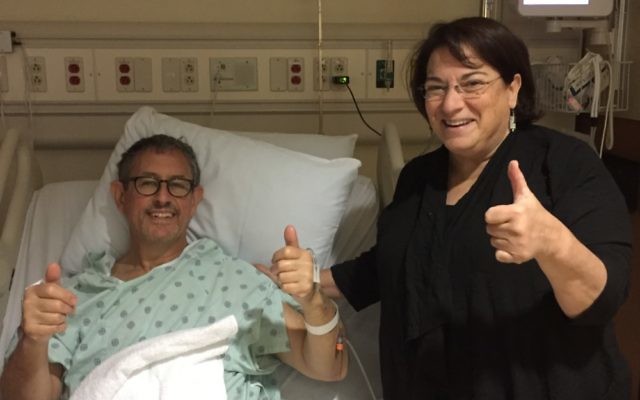Robkin Donates Kidney Because He Can
By Logan C. Ritchie
Why we have two kidneys when you can live quite fully with only one is a medically philosophical question, said Shai Robkin, a recent kidney donor.
According to the National Kidney Foundation, 100,000 people in the United States are awaiting a kidney transplant. Only 16,000 each year receive a donation; 5,500 of those come from living donors.
The week after Thanksgiving, Robkin underwent a procedure to donate one of his kidneys. The Sandy Springs resident did not know the recipient; he knew only that she was in need.
Robkin, an expert on behavioral economics, is inspired by evidence, facts and statistics. A few years ago he attended a class taught by Steven Chervin at the Melton School of Adult Jewish Learning. Chervin’s lecture on Jewish ethics surrounding organ donations motivated Robkin to learn more.
Robkin was inspired by this Talmud lesson: Whoever destroys a soul, it is considered as if he destroyed an entire world. And whoever saves a life, it is considered as if he saved an entire world.
There is a strong consensus in the rabbinic world that if you can donate an organ, you should do it, Robkin said. Behavioral economics proves that the perception of risk consistently overrates threats and undervalues benefits.
Robkin began to study the phenomenon of exchange of goods without reward, namely money. He read up on 2012 Nobel Memorial Prize in Economic Sciences winner Alvin Roth, an Ivy League professor and founder of the New England Program for Kidney Exchange.
Robkin felt the clock was ticking on his kidneys. He heard that after age 65 people are not eligible for donation. When facts started pointing him toward donating a kidney, he contacted two hospitals and began the yearlong testing process.
“If you ever want to get thousands of dollars of free medical tests, donate a kidney,” he said with a laugh. Donors “have to be willing but also able. You will not be accepted without perfect health.”
Robkin has good genes and maintains a healthy lifestyle. He does not smoke and rarely drinks alcohol.
Tests performed at Emory University Hospital included blood, urine, heart and lung function, and psychological state.
Robkin then chose the time frame in which he was willing to donate, and a match was made. He opted to meet his kidney recipient after the procedure.
“Nothing I could have learned before the surgery that would make me feel more positive about donating, but I could have learned something negative,” he said, referring to his strong political views.
One day after surgery Robkin met the woman who received his left kidney in an emotional gathering. The Carrollton resident and her daughter, also a donor, are Baptist. When she told Robkin that “G-d has his ways,” he responded that she probably never had so many Jews praying for her.
After two nights at Emory University Hospital, with less pain than he anticipated, Robkin was discharged.
A few friends tried to discourage Robkin from donating, but “if I have one dominant personality trait, it’s persistence.”
Judy, his wife of 40 years, likes to joke that the time between a thought entering his mind and his resulting action is the time it takes a traffic light to turn from red to green.
“One of things about Shai is that when he says he’s going to do something, I know it will happen. That’s just the way he is. He’s an activist. He’s passionate about everything he does,” she said.
Robkin said there is only one thing he cannot do because of the donation: He can never again take NSAIDs (pain relievers such as ibuprofen, Aleve and aspirin). He plans to continue going to the gym — his morning routine — and ride his bicycle.
“There’s almost nothing you can’t do with one kidney that you can do with two,” he said. “Why did I do this? Because I can.”





comments